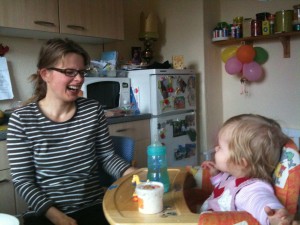Stories like this one put me completely at ease with my own flaws as a parent. Whatever decisions I make as a father, I can pretty much guarantee I won’t become the ringleader, along with my children, of a murderous, child-abusing cabal in rural western Missouri. Actually, stop reading the linked article after first few paragraphs, because if you read too many of the details, which are sick and foul and truly disturbing, then you will hate me for having led you there.
What Almost Made Me Cry Today: “Marley & Me”
I may not like dogs or Jennifer Aniston, but watching Owen Wilson as a somewhat smarmy newspaper columnist saying good-bye to his dying, incorrigible pooch was almost too much for me.
Almost. On a man-tears scale of 1 to 10, I’d give this is 6. Next time, make the dog a cat.
I Own All of These Things
Because there are an infinite number of Websites, there is, of course, the “Top 5 Worst Baby Shower Gifts.”
My favorite: the peepee teepee.
The one I wished I was shocked existed: baby high heels.
The one I actually owned (blame the ex): the baby-wipe warmer.
Anyone out there have stuff that should have made the list, I’m all ears.
Viva the European Welfare State!

Life is no less complicated in Europe, of course: people die, divorce, and occasionally find themselves imprisoned in Austrian dungeons. But the German government is making at least one part of life a little easier: parenting.
I just got back from a week in Berlin and beyond visiting friends with babies, all of whom rely, in one way or another, on the largesse of German social policy. I had been aware, of course, of the European welfare state. Every Teabagger I met in my last trip to Wasilla had lots to say about it, none of it positive or particularly well-informed.
And yet, tell me you’re not jealous: New parents get a total of 14 months of paid time off between the two of them (you get 76% of your former net salary if you had a fulltime job; the self-employed get a minimum of €300, or about $445, a month). The parents can decide themselves how to split it. My friends Martin and Manuela in lovely Raben Steinfeld are going for a traditional split: She will take 12 months off, he will take two.
There’s more:
- Mothers get a little extra financial support in the first two months after giving birth.
- Women don’t have to tell prospective employers that they’re pregnant.
- It’s virtually impossible to fire a pregnant women, for any cause.
- You can take up to three years off after your child is born, and you are guaranteed to get your job back.
About schooling: Depending on what state you live in, there’s guaranteed access to daycare and preschool. One friend was paying €200 a month for a preschool that lasted seven hours a day. In Berlin, tuition is whatever you can afford, so some friends of mine are paying less than €60 a month. The state takes care of the rest.
Even if you work longer than school lasts, a Tagesmutter, or “day mother” (i.e, babysitter, and a nicer way of putting it, methinks) costs about €5 an hour.
In comparison, most preschools in Manhattan charge over $10,000 a year.
Even outside of direct government initiatives, there are organizations like the Association of New Education, which was started in 1946 by anti-Nazi education reformers and now, according to at least one of my friends, is an indispensable source for parental activism, outreach, and counseling. Typical of the German approach to parenting, they make a direct (if also wonky) connection between healthy families and healthy nations: “Parents are models for a democratic coexistence.”
I don’t think less maternity leave would cause the Third Reich to rise again, but there is something beautiful about seeing my friend Viviane, pictured above with her daughter Frieda, able to deal with the vicissitudes of life as a single mom (including a freak knee injury) without feeling like the world was against her. In fact, in Germany, the world is pretty much on her side.
This certainly seems a better way to encourage population growth than the stunts that Russia has had to pull.
With so many of our own societal problems traceable to poor nutrition and the latchkey chaos of growing up less than wealthy in the U.S., is it unreasonable to hope we could support families the way the Germans do? Forget Obamacare: I want to see Obamadaycare.
